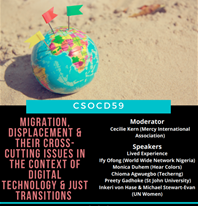
24 Feb MIGRATION, DISPLACEMENT & THEIR CROSSCUTTING ISSUES IN THE CONTEXT OF DIGITAL TECHNOLOGY & JUST TRANSITIONS/UNANIMA
With only 10 years remaining to achieve the 2030 Agenda, accelerated action in addressing the inter-linkages between three pillars of sustainable development, social, economic, and environmental, is essential. Migration and displacement remain among the adenda’s largest
cross cutting issues which have the potential to aid and hinder it’s achievement. The theme of the 59th Commission for Social Development “Socially just transitions towards sustainable development: the role of digital technologies on social development and well-being of all” has offered
us as a global community to discuss the ways in which such intersecting issues can contribute to meaningful solutions.
Unfortunately, like many vulnerable groups globally, Migrants and Refugees are subject to violations of human rights, discrimination, and exploitation. According to the Office of the High Commissioner on Human Rights (OHCHR), “Violations of economic, social and cultural rights are daily experiences for countless migrants who are denied access to digital technology, public health care, adequate housing, and essential social protection.”
Women and children continue to be disproportionately represented and comparatively vulnerable within this population. While
this population often faces discrimination and adversity, especially in a post COVID world, it is evident Migrants and Refugees contribute greatly to their host countries from both an economic and cultural perspective.
Migration and displacement in practice and purpose a depiction of transition. Heavily influenced by digital technology, in the modern world ensuring this experience is not plagued with cross cutting issues such as forced displacement, climate change and inequalities is integral, if we as a global community are to build a just, sustainable future. The success of just transitions remains a balancing act for state and non-state actors alike and
needs to be addressed accordingly.
The event that we shared through this LINK not only explored and addressed the Commission’s theme in the context of migration and displacement but also provided concrete links between the priority theme of this commission as well as its past priority themes, specifically that of CSocD58.
The conversational dialogue was an opportunity for members of the panel to discuss drivers, outcomes, policies, and solutions. Staying true to our mantra “don’t talk about us, without us”, this event hosted a number of conversations between different types of experts on a common theme,
exploring the issues through the eyes and voices of people dealing with them on the ground; advocates and peoples with a lived experience as well as others thematic experts such as academics, Member States and United Nations Experts. This inherently providing a holistic and
in depth analysis and solution of the aforementioned issues in the context of the commission’s theme, lighting the way for a brighter future where technology and inclusive development contributes to just transitions and well-being for all.

